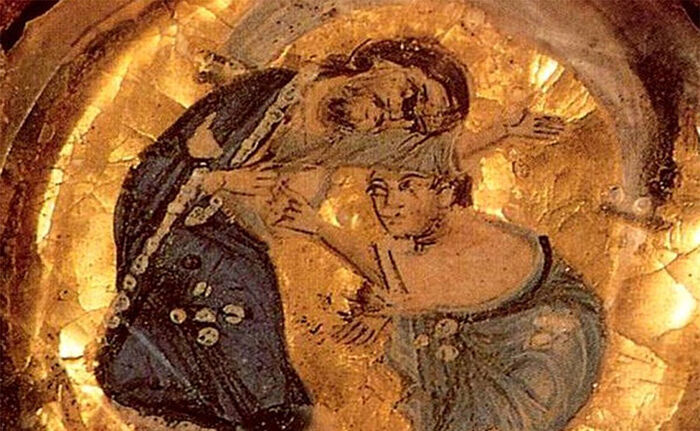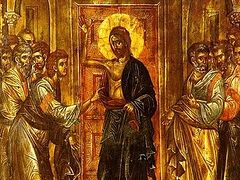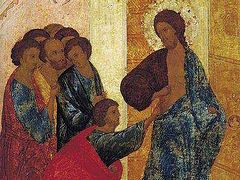In the name of the Father and the Son and the Holy Spirit.
For many of us, the question of faith in the Resurrection of Christ seems to have been settled long ago. Of course we believe He is risen. Year after year, we read about it, we hear about it in homilies, we proclaim it to one another with the Paschal greeting throughout all of Bright Week: “Christ is Risen!” And on the Sunday following Bright Week, the Church turns our attention to the Gospel episode of the Apostle Thomas’ unbelief in the resurrected Christ. Why does it do this? It is just so we can discuss the faith of the Apostle Thomas, or is it for the sake of something else that is revealed to us in this event? If the first Sunday of Pascha, uniting us in universal joy and triumph, emphasizes and highlights the Person of Christ and the event of His glorious Resurrection, then the second Sunday, known as Thomas Sunday, turns our attention to ourselves, in the search for our own personal living faith, which through the inner spiritual connection we all have with Christ should confirm the resurrection of our spirit and our person even in the present life.
The moment of the Apostle Thomas’ encounter with the resurrected Savior is a bright and impressive Gospel episode, where the resurrection of the spirit and person take place, as well as the transition of the human consciousness here on Earth from a temporary to eternal existence. What meaning could this Gospel event have for us today if it’s considered simply as an historical fact, only involving the question of the Apostle Thomas’ faith? Do we have the right to criticize the unbelief of the Apostle Thomas and the words he uttered: Except I shall see in His hands the print of the nails, and put my finger into the print of the nails, and thrust my hand into His side, I will not believe (Jn. 20:25)?
St. Thomas was the disciple who invited the others to die together with Christ when He went to Bethany to resurrect Lazarus, despite the mortal danger from the Jews. In the Gospel of John, we find the following words from the Apostle Thomas: Then said Thomas, which is called Didymus, unto his fellow disciples, Let us also go, that we may die with Him (Jn. 11:16). These words show us how deep and sincere was the Apostle Thomas’ love for Christ. We can only imagine how deeply his heart was wounded by his separation from the Savior, from the realization that He was no longer there. The words of those who saw the risen Lord can hardly calm the suffering and inconsolable heart of the Apostle Thomas—he still grieves heavily over the loss of his beloved Teacher. “If He is truly alive, I’ll have to see Him, to feel Him with all my senses, and only then will my heart calm down”—the Apostle Thomas mentally resists the admonitions of the witnesses who had seen the risen Christ. What stands out is the stubbornness of the Apostle Thomas, which can also be regarded as his unbelief. He stubbornly resists not just one person, but many who testified that at various times and in various places, they had communed with the risen Christ.
But here I would like to say a word in defense of the Apostle. His stubbornness, or unbelief, doesn’t come from the pride of a mind resisting a Divine event, but rather from a loving, suffering heart that cannot be calmed simply by hearing from others. This heart boldly longs for the fullness of communion with Christ, to feel Him just as before the death of the Savior. The unbelief of the Apostle Thomas is a challenge to the risen Christ, coming from a fervently loving heart and a thirst for communion with Him Whom he sacrificially loved, revealed in the bold inner desire to see Him. This unbelief, uttered in the language of love, is not something negative and empty, but represents a bold departure from the initial faith, born by hearing (Rom. 11:17), which the Apostle Paul mentioned in his epistles, to a contemplative, spiritual faith, which alone is able to fully unite a man with Christ in a living experience of communion with Him, making him thereby a partaker of Divinity.
Sometimes we think we believe deeply. But this faith can come from an external understanding, from something we read or heard from others, and not from a real inner experience and union with the risen Lord. Without a living communion with Christ, we are spiritually defenseless; “We try to cling to the experience of others, the experience of people who testify that they have seen God and spoke with Him. And we try to present this experience objectively, forcing it into superficial concepts that support our logic; to build a psychological self-sufficiency, an armor on the foundation of this logic that would protect us from fear and panic,” in the temptations and trials of our faith and faithfulness to Christ that come upon us.
Any judgment we make about the faith or unbelief of the Apostle Thomas will look too superficial; after all, he experienced a state that was both personal and supernatural at the same time. The unbelief, the doubt of the Apostle Thomas is not cold skepticism, comparable to the doubt or unbelief of an atheist or someone who is simply indifferent towards Christ. This is doubt foretelling an encounter. This is doubt foretelling absorption by Divine love, an ineffable Divine revelation that changes and transfigures human consciousness, a revelation that has cosmic significance, because it affects the existential laws of the whole universe. After his encounter with the risen Lord, the Apostle Thomas no longer perceives death as the end of existence, but as the beginning of man’s continuing existence, in a new, unending life—not only of the rational soul, but also of the renewed body, which the Apostle will touch when He sees the risen Savior before him.
It may seem that those positive moments that were emphasized in relation to the Apostle Thomas, his strong desire to see and touch Christ, of which we spoke above, are at variance with the words of the Savior addressed to the Apostle: Blessed are they that have not seen, and yet have believed (Jn. 20:29). It looks like the Lord is exalting faith over vision, lowering the spiritual bar for Christians, because simply believing seems easier for us than to strive for a vision of Christ. What is the reason for Christ’s elevation of faith over vision? It’s certainly not the diminution of vision as compared with faith, not the desire of Christ to be hidden from people—but on the contrary, His desire to become as close to man as possible. For the sake of this union with Christ, we are given the Sacraments of the Church, in which man dies and is born again, spiritually feeds and grows, and unites his entire being to Christ, Till, according to the Apostle Paul, we all come in the unity of the faith, and of the knowledge of the Son of God, unto a perfect man, unto the measure of the stature of the fulness of Christ (Eph. 4:13).
According to the Apostle Paul, faith is connected with the knowledge of the Son of God, Christ, and this is the key for our healing and salvation. The rebuke of the Apostle Thomas is the rebuke of a man who relies upon the same means of knowledge in his communication with God as he does in the material world. The true meaning of Christ’s words has to do with the means of knowledge that the Apostle Thomas chose—in his ignorance desiring to see the Lord as he was accustomed to seeing people and things in the world around him in ordinary life, using only his mind and bodily vision. Jesus saith unto him, Thomas, because thou hast seen Me, thou hast believed: blessed are they that have not seen, and yet have believed (Jn. 20:29). The faith of which Christ speaks is also vision, but different, above nature, which must be revealed to a Christian in his spiritual struggling. According to St. Isaac the Syrian, “Faith is the door to mysteries. As the bodily eyes see sensory objects, so spiritual faith beholds with its eyes that which is hidden.”
The holy Apostle Thomas’ insistence regarding the vision of the risen Christ and the Savior’s words addressed to him reveal to us an historical event in this Gospel episode that can be a prefiguration of our own encounter with Christ in the Sacrament of the Eucharist. Every time we approach the chalice and receive Holy Communion, we surpass the Apostle Thomas in our degree of closeness to God. He only touched His Body with his hand: Reach hither thy finger, and behold My hands; and reach hither thy hand, and thrust it into My side (Jn. 20:27). But we eat the Most Pure Body of Christ. He contemplated Christ without himself, but we have the opportunity to contemplate Him within our very selves. But the question arises whether we recognize Christ with our spiritual senses when we are united with Him, just as the Apostle Thomas recognized Him when He touched His wounds, and in exultation, full of love, exclaimed: My LORD and my God! (Jn. 20:28).
Yet a little while, and the world seeth Me no more; but ye see Me: because I live, ye shall live also (Jn. 14:19), the Savior says in the Gospel of John. With these words, Christ draws a line between the outside world, which rejected Him, and the world where, through the mystery of faith, He is beheld as risen. This line doesn’t pass through the external environment, outside of ourselves—it passes right through our hearts, where both grace and sin are present; light and darkness, faith and unbelief. And there, for those who seek Him, also resides Christ. “Thus,” says St. Symeon the New Theologian, “in those in whom the risen Christ appeared, He is infinite, seen with spiritual eyes. For when Christ comes to us by the grace of the Holy Spirit, He resurrects us from our formerly dead state, gives us life, and enables us to see Him within ourselves, alive, immortal, and incorrupt”—Him Whom the Apostle Thomas, whose memory we commemorate today, longed to see not with his spiritual, but bodily vision. By the prayers of the Apostle Thomas, may the Lord enlighten us to more often lose our fascination with the visible world and see with a sober mind the risen Christ in the depths of our hearts.
Amen. Christ is Risen!




